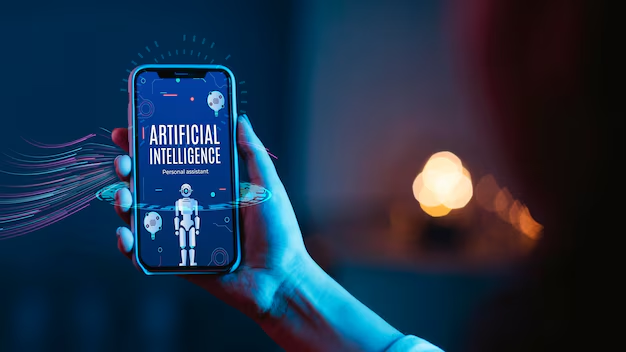Artificial intelligence (AI) has evolved from a futuristic concept to a transformative force in modern life. Its impact is felt across various sectors, from healthcare and education to finance and transportation. The Future Of AI As AI continues to advance, it promises to revolutionize how we live, work, and interact with technology. This article explores the profound effects of AI on everyday life, highlighting its potential to enhance productivity, efficiency, and personalization.
Introduction to AI in Everyday Life

AI is no longer confined to the realm of science fiction; it is an integral part of our daily routines. From voice assistants like Siri and Alexa to smart home devices, AI is reshaping how we interact with technology and the world around us. Its applications are vast, ranging from automating mundane tasks to revolutionizing industries.
AI in Personal Assistants and Smart Homes
Personal assistants powered by AI, such as Google Assistant and Siri, use natural language processing to understand and respond to user queries. These assistants streamline tasks, enhance productivity, and provide personalized recommendations. In smart homes, AI integrates various devices to create a seamless and automated living experience, anticipating and fulfilling our needs with minimal input.
AI in Healthcare
AI is revolutionizing healthcare by analyzing vast amounts of medical data to identify patterns and predict outcomes. This aids in early disease detection and personalized treatment plans. Wearable devices equipped with AI monitor vital signs, detect anomalies, and alert individuals and healthcare providers to potential health issues in real-time. AI also enhances drug discovery and patient monitoring through virtual nursing assistants.
AI in Education

AI transforms the learning experience by customizing educational content and pacing based on individual student needs and learning styles. Adaptive learning platforms, virtual tutors, and chatbots provide additional support and feedback, enhancing student engagement and academic performance. AI also helps digitize textbooks, detect plagiarism, and gauge student emotions to identify those struggling or bored.
AI in Finance and Banking
In finance, AI powers chatbots that provide personalized customer service, assist with inquiries, and manage accounts. AI algorithms analyze market trends and consumer behavior to make data-driven investment decisions and minimize risks. Banks use AI to detect fraud, conduct audits, and evaluate customers for loans, enhancing security and efficiency.
AI in Transportation
The automotive industry is embracing AI with the development of autonomous vehicles. Advanced sensors and deep learning algorithms enable cars to perceive their surroundings, navigate roads, and make split-second decisions to ensure passenger safety. As self-driving technology matures, it has the potential to reduce accidents, alleviate traffic congestion, and revolutionize urban mobility.
AI in Employment and Work
AI is transforming employment by automating processes in manufacturing, logistics, and service industries. While this change necessitates a shift in skill sets, it also opens up new opportunities for specialized roles. Customer service is significantly impacted by AI-driven chatbots that comprehend and respond to consumer inquiries instantly.
AI in Media and Entertainment
AI is making waves in media by automating content creation, such as news reports, and enhancing personalized entertainment experiences. Generative AI tools, like ChatGPT, raise questions about their use in journalism but offer immense potential for content creation and analysis.
AI in Customer Service
AI-powered customer service tools, including chatbots and virtual assistants, provide data-driven insights to both customers and providers. These tools enhance customer experience by offering instant support and personalized solutions.
AI in Manufacturing

Manufacturing has long benefited from AI, with industrial robots performing tasks like assembly and predictive analysis to keep equipment running smoothly. AI continues to improve efficiency and productivity in this sector.
The Future Of AI: Trends and Predictions
Looking ahead, AI will play a central role in the evolution of smart homes, healthcare diagnostics, personalized entertainment, and augmented reality experiences. As technology advances, AI will become even more integrated into daily life, making tasks easier, more efficient, and personalized. However, addressing ethical and societal considerations, such as data privacy and algorithmic biases, is crucial for ensuring AI serves the needs of all individuals.
Also Read : 5G Technology: Revolutionizing Communication And Connectivity
Conclusion
The integration of AI into everyday life is transforming how we work, communicate, and navigate the world. By harnessing the power of AI responsibly and ethically, we can unlock new possibilities and enhance our quality of life. As AI continues to evolve, it holds immense potential to revolutionize industries and daily routines, paving the way for a future where technology enriches every aspect of our lives.
FAQs
What are the primary applications of AI in healthcare?
AI is used for early disease detection, personalized treatment plans, and remote patient monitoring.
How is AI impacting education?
AI customizes learning experiences, provides virtual support, and enhances student engagement.
What role does AI play in finance?
AI analyzes market trends, detects fraud, and makes data-driven investment decisions.
How is AI changing transportation?
AI is developing autonomous vehicles that can navigate roads safely and efficiently.
What are the ethical considerations of AI integration?
Ensuring data privacy, mitigating algorithmic biases, and promoting equitable access to AI technologies are key ethical considerations.

